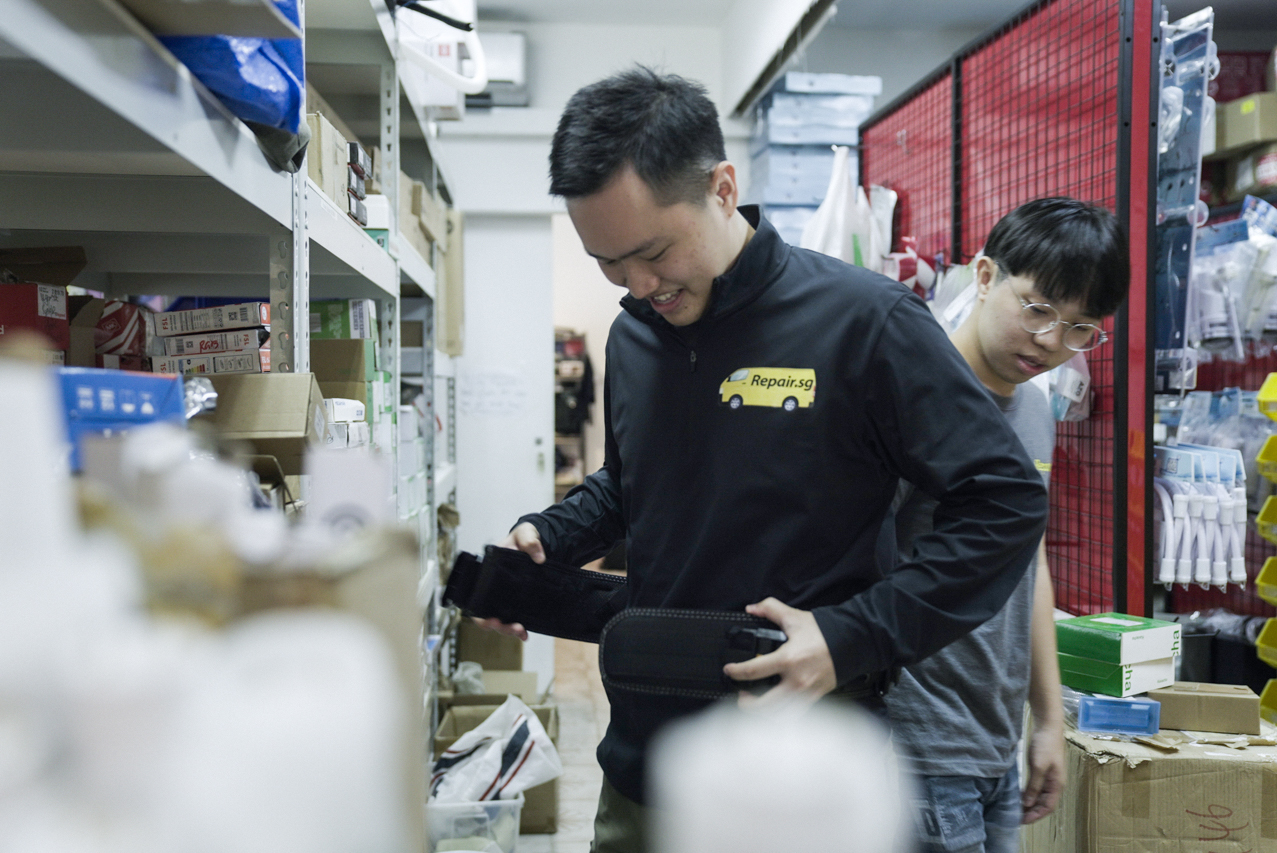All images by Isaiah Chua for RICE Media.
Whenever anything breaks down at home, I usually expect a surly, old uncle in a faded singlet to show up to fix it, not Gen-Z brothers Zames and Amos Chew.
The duo run Repair.sg, a handyman company that operates out of a workshop in Katong.
As 26-year-old Zames warmly ushers me into their workshop, a rainbow of pipes, paints, tubes, screws, and tools surround us. One could almost confuse the workshop for an F1 pitstop.
They’ve recently expanded into pest control: repair manuals scatter Zames’ desk, with a whiteboard filled with techniques, formulas, and products he’s been picking apart for a job.
“He’s a perfectionist,” 24-year-old Amos chuckles. Amos is fresh from a business meeting across town, utility belt in tow. It’s clear to me: these guys are workaholics who love their jobs.
I never realised repair work could reach this level of meticulousness, nor did I think someone of my own generation would care to do it.
Yet, Zames and Amos have built fulfilling careers out of it by starting Repair.sg, trying to bring greater transparency and care to an industry conventionally known for its cutthroat practices.
For the brothers, blue-collar is the new black.
Pastime to Profession
Zames first claimed the Repair.sg domain in secondary school, buying it “for fun” along with a handful of other generic names to experiment with business ideas.
The brothers say they have always been intrigued by entrepreneurship, particularly with the idea of creating value for others from scratch.
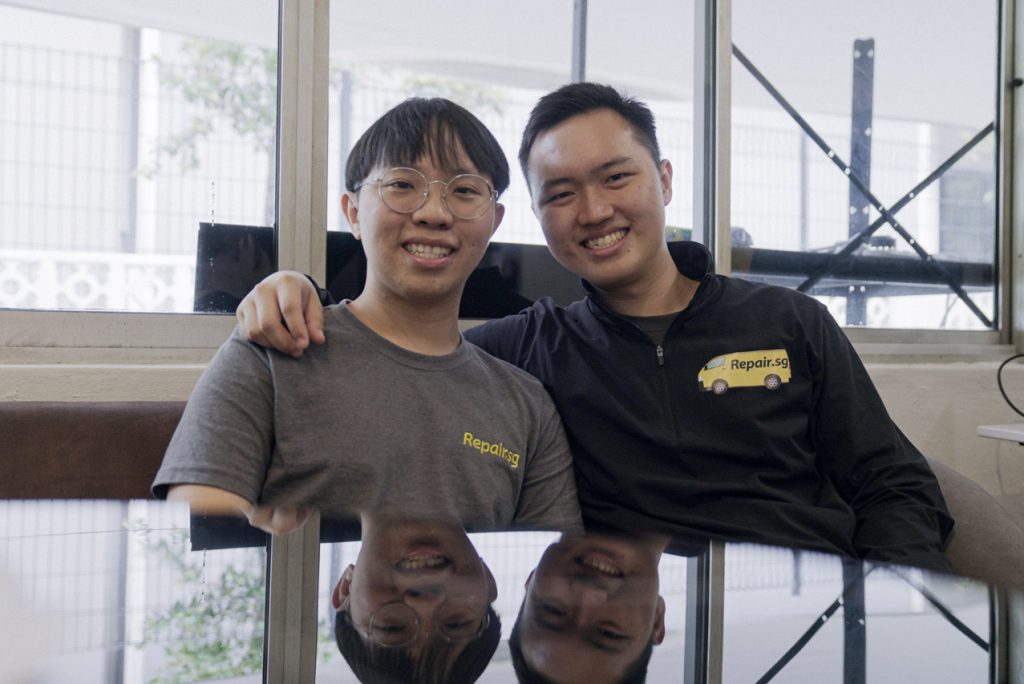
Home repair work attracted them for similar reasons. Zames and Amos compare it to “puzzles and mini-missions in a video game”. It was a hands-on challenge they could tackle after watching a few YouTube tutorials.
Nowadays, Zames and Amos can dismantle a faulty air-conditioner in mere minutes. This tag-team flow state was honed from countless hours of practice, fuelled by simple curiosity.
They secured their first clients in 2016 via cold calls and advertisements on Google. If a job seemed compatible with their skill set, they’d take it. The pair were so eager to learn that they’d undercharge, just to rack up more job experience.
“Wanting it badly enough was what allowed us the necessary confidence to at least take a shot at doing this… Money was not the first thing on our minds,” Zames says.
The brothers started small by assembling furniture. Soon, they started fixing power sockets, lights and other home fixtures. By Zames’ early polytechnic years, their determination to improve at their craft and grow the business drove them to rent a small office space.
Their parents, unfamiliar with entrepreneurship, weren’t particularly opinionated on the brothers’ endeavours, Repair.sg included. So when Zames graduated from polytechnic in 2019 and was unexpectedly medically exempted from National Service, he felt little pressure to find ‘traditional’ work.
Zames knew that he and Amos wanted to start something of their own. But after toying with other projects and ideas, including website creation and selling fidget toys, Zames realised very few other enterprises matched the same completionist zing that came with handyman work, much less the same joy he saw it bring to others.
Zames recalls the brothers helping a panicked customer restore her electricity over the phone late at night. This simple act of goodwill, marked by her heartfelt thanks, was one of the first times they felt their work truly mattered.
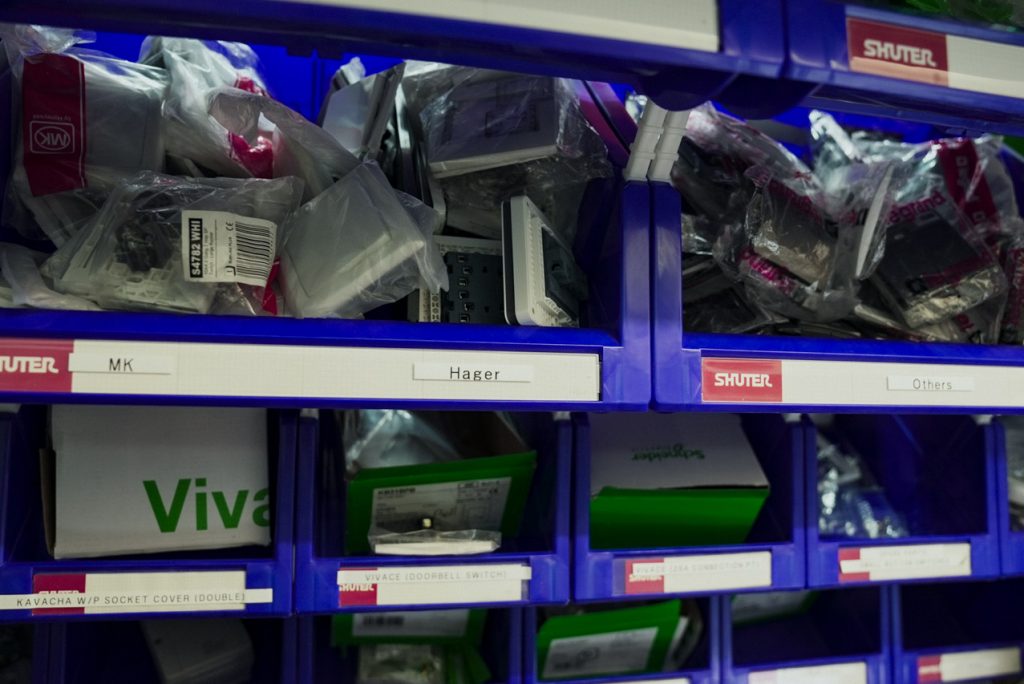
When Amos finished polytechnic in 2021, Zames knew it was time to fully commit themselves to their repair business full-time.
“If other [larger, similar businesses] can do it, then why can’t we at a much smaller scale? After each milestone, we just work on the next step.”
They had no backup plan. They were barely breaking even, and living off cai png. But the satisfaction of the work outweighed the risks.
The New Kids On the Block
Whenever I call a repairman, I brace myself for overcharging, poor service, or both. Zames tells me this isn’t paranoia. It’s a reflection of what’s wrong in the industry.
Home maintenance companies are essential services with overwhelming demand. However, many workers in the trade are near-retirement: the median blue-collar worker in Singapore is 56 years old, more than the brothers’ ages combined.
“Where there’s opportunity and a lack of supply… there is always room for people that are greedy,” Zames muses.
Respectfully, there are respectable repairmen out there. But with fewer players in the field, some unscrupulous companies are emboldened to fleece clients. Tactics can range from using faulty replacement parts to offering free on-site inspections only to give customers an inflated quotation afterwards.
Amos recalls a customer who was quoted $800 for a full electrical box replacement by a rival after a ‘free’ inspection. Turns out, all they really needed was a simple $90 wire tightening.
The normalisation of these practices is clear. Early on, even their own staff pressured the brothers to conform to these industry norms.
“We had this internalised insecurity of being young,” Zames admits. The state of the industry led the brothers to ponder whether committing to being upfront and honest with their customers would really pay off.
But they held their ground. Amos, who shares his brother’s values, kept them anchored. And, ironically, their youth would become one of their assets.
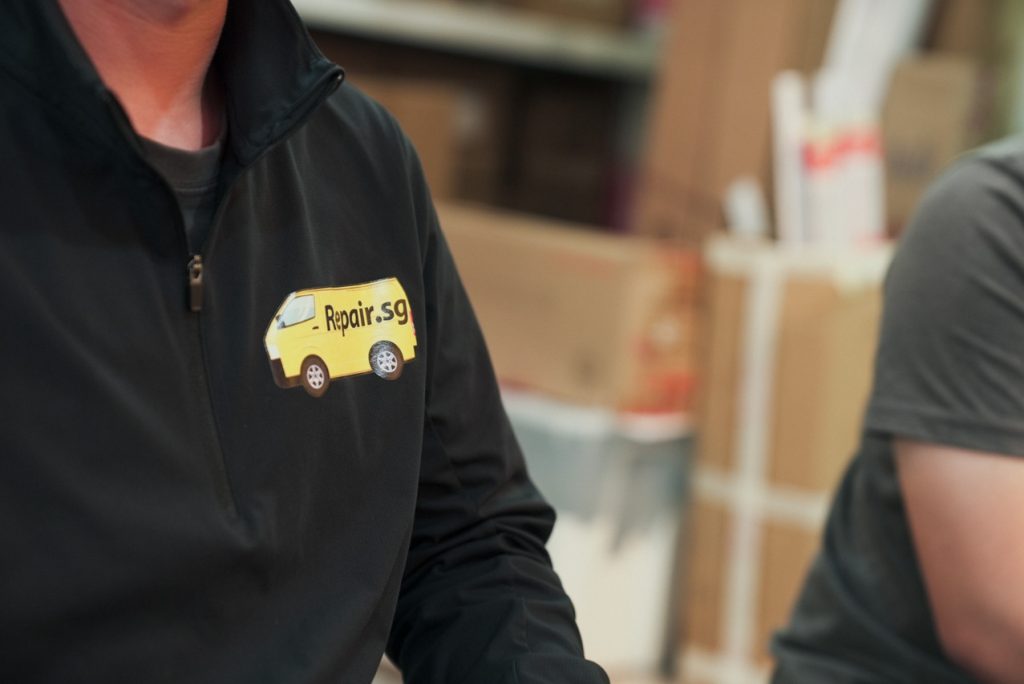
Older tradesmen were happy to share knowledge, enthused that these youngins wanted to continue their craft. Customers were forgiving when the brothers messed up, as long as they owned up and fixed it.
“The gain that we got out of it was worth more to us than the fear of getting it wrong,” Zames says.
When they started out, their handiwork was far from perfect—Zames confesses they’ve broken a few lightbulbs—but their sincerity and transparency won customers over.
Amos says many of their earliest clients from the pandemic remain loyal customers, and have referred them to countless other customers.
Zames points to a fridge behind us, filled to the brim with complimentary drinks and food from customers.
Over the years, it’s become apparent to them that when you run a company with integrity, kindness follows.
“In combination with the fact I’m working with my best friend, and everything else as a whole, I’m doing something that I enjoy,” Zames says.
Looking Past The Numbers
By 2023, Repair.sg had built enough momentum that Zames and Amos could begin to comfortably expand, now delegating operations between a team of twenty people.
Zames now focuses on the business’s long-term prospects as CEO, whilst Amos maintains Repair.sg’s day-to-day operations as COO.
Although he’s taken a step back from the actual repair work, Zames knows none of this would’ve worked out if he didn’t enjoy the nuts and bolts of it in the first place.
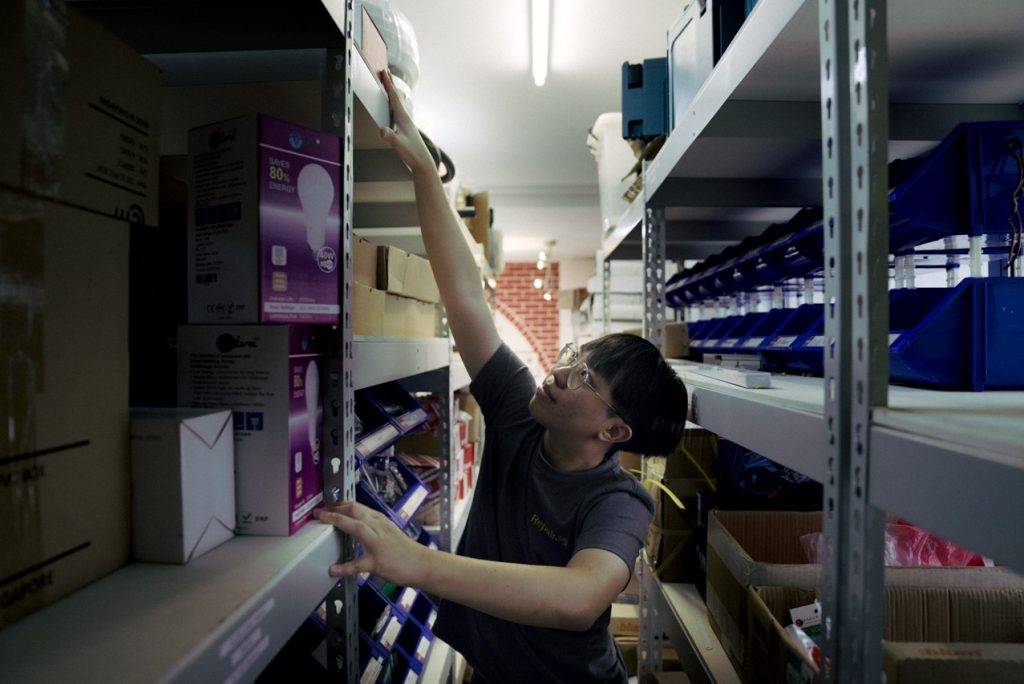
They no longer struggle to afford cai png. But Zames is wary that people might look at their success and miss the point.
“If I tried to run a restaurant because I wanted to make eight figures, I would never get there, because inherently, I don’t enjoy it.”
He emphasises he and his brother didn’t go into blue-collar work to make bank. To him, real fulfilment starts before the profits.
Currently, their profit margins are still relatively modest, hovering around 15 percent. It’s comparable or even slightly less than what others in the market make, Zames says. But Zames and Amos are just happy they’re well past the 0 percent net margin they had when they first started out.
Although he declines to give an exact figure, Zames notes he averages a similar paycheck to his peers in the 9-to-5 corporate world, although some of that cash is reinvested back into the company.
However, they’ve worked night and day to have the success they have now, and the blue-collar grind continues to demand everything from them as they try to give the industry new life.
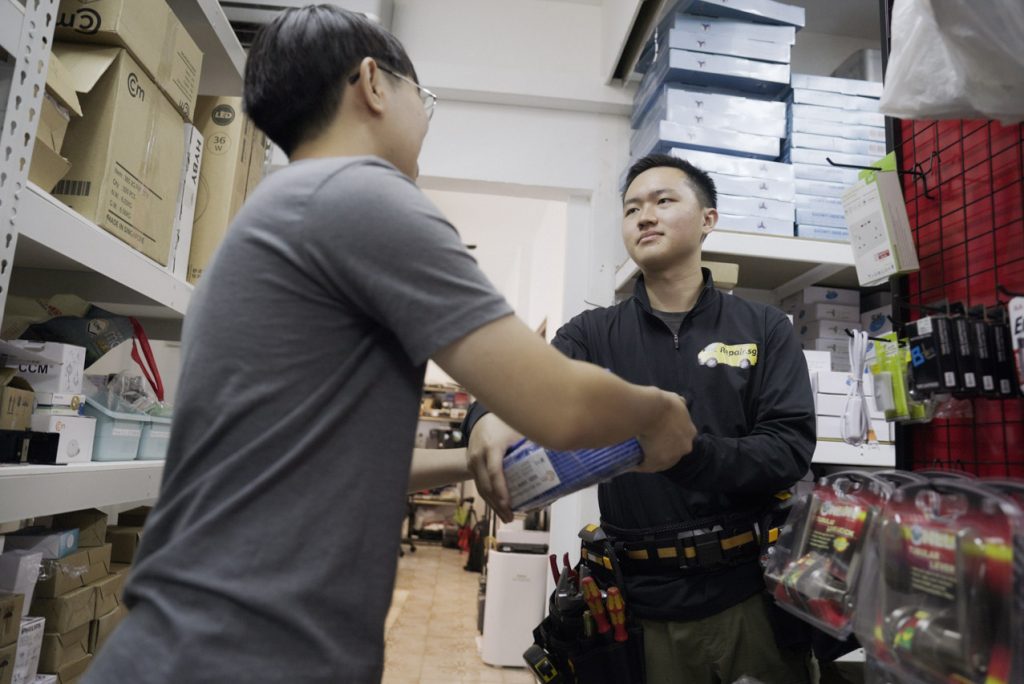
Zames and Amos are usually at work almost 12 hours a day, six days a week, tinkering with new tools and going for site visits to level up all their services, from plumbing to electric work to pest control alike.
“I don’t have a car myself. I don’t own a house,” Zames says.
“I’m trying to build the company to a point where I can take care of myself and my loved ones, but I’m not there yet. What I’m really focused on right now is delivering the most value to our customers. I believe that the rewards will follow after.”
Fixing What Matters
As CEO, Zames no longer has to go out on repair jobs, but he says he still does it to relax.
“I don’t have to think about hiring, or payroll, or HR,” he says. “I just get to enjoy the work.”
For a generation full of ambition to break out of the conventional ‘rat race,’ many of us sometimes forget to enjoy the process of our work in the first place.
Zames and Amos show that fulfilment doesn’t have to come with reinventing the wheel. While many dream of changing the world, the brothers simply set out to change how one corner of it works.
It’s not sexy, nor is it revolutionary. But there’s dignity in fixing what’s broken—people’s homes and industries alike.

